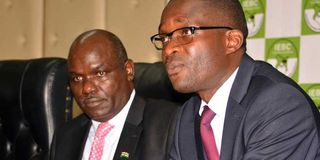NATION AGENDA: All eyes turn to four key figures

IEBC chairman Wafula Chebukati (left), and CEO Ezra Chiloba. these two have the biggest responsibility to deliver free and fair elections on August 8. PHOTO | EVANS HABIL | NATION MEDIA GROUP
What you need to know:
- A lot of Mr Chiloba's time at the commission has been spent fighting fires instead of preparing for elections.
WAFULA CHEBUKATI, IEBC chairman and EZRA CHILOBA, IEBC CEO
As referees, these two have the biggest responsibility to deliver free and fair elections on August 8, amid many challenges.
Both insist they are up to the task, yet the period leading to the elections has been marked by many uncertainties.
For starters, Mr Chebukati and his commissioners are hardly a month old at the institution.
Johan Kriegler, the South African judge who led an investigation into the handling of the disputed 2007 elections, recommended that IEBC needs a minimum of two years to prepare adequately to conduct a free and fair election.
One could argue that Mr Chiloba, who has been CEO since January 2015, meets this threshold.
But a lot of his time at the commission has been spent fighting fires instead of preparing for elections.
The new commissioners came into office after their predecessors were removed following opposition claims of bias in the 2013 elections.
There are other obstacles on the road.
COURT CASES
Court cases challenging procurement of election materials and resignation timelines for civil servants with political interests have the potential to throw a spanner in the works in their preparations.
Then there is the issue of the integrity of the voters register, with reports of double registrations.
Mr Chebukati has admitted that there are 128,926 duplicate ID numbers in the BVR database, which he has attributed to data entry errors at the time of registration, attempts by individuals to register more than once or more than one individual sharing one ID card to register.
These, he has said, will be taken care of during the clean-up of the register. But this has done little to assuage the fears of many, with reports that even IDs of former presidents Daniel Moi and Mwai Kibaki had been used to register other people.
Thus, these two individuals have the greatest job on their hands — to earn trust across the political divide.
JOSEPH BOINNET, Inspector General of Police
Mr Boinnet was named to his post in 2014 following the resignation of his predecessor David Kimaiyo.
Mr Kimaiyo was forced out after a series of terror attacks by the Somalia-based Al-Shabaab group.
Now Mr Boinnet has the responsibility of ensuring that Kenyans vote in a peaceful manner amid threats from many quarters, including the terrorists who cost his predecessor his job.
But there are other challenges, principally, incitement and hate speech from players in the elections.
SPECIAL POLICE OFFICERS
Police numbers are expected to get a boost of about 10,000 officers.
Mr Boinnet will also follow tradition by appointing special police officers from other security agencies.
Police mobility is also boosted after President Kenyatta initiated a leasing programme for vehicles.
Last month police received 525 new vehicles, including armoured personnel carriers (APCs). The delivery increased police vehicles by 2,720 since 2013.
On aerial transport, the police air wing is expected to have seven serviceable choppers by election date, compared to 2013 when only one chopper was available.
The APCs will be deployed in the northern part bordering Somalia where the Al Shabaab threat is much more pronounced as witnessed by last week’s attack on a police post in Mandera, where the militants stole a BVR machine.
DAVID MARAGA, Chief Justice and president of the Supreme Court
The institution he leads will be responsible for determining all disputes that arise in the post-election period.
The elections come within the first year of his term although Mr Maraga is an old hand in the Judiciary, having risen to the top through the ranks.
He says a lot of work on election preparedness has been undertaken since the formation of a specific committee on election matters six years ago.
The Judiciary Committee on Elections (JCE), which he headed before he was appointed CJ, has steered all election dispute management preparations.
He says JCE is currently involved in preparing judges, magistrates and the Judiciary in general for the next round of election petitions.
One big challenge he faces, however, like his predecessor Willy Mutunga in 2013, should there be a presidential election petition, is timelines.
There is general consensus that the time allocated to determine a presidential election petition, 14 days, is not sufficient.
JCE and other stakeholders made proposals to increase that period to 30 days which has not been done.
However, he says the Supreme Court will be ready to determine such a matter within the constitutional deadline.


